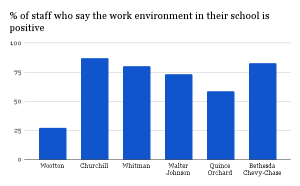Lifeline to local news closing creates void in community
February 14, 2020
With perhaps more history than the majority of major-news networks across the nation, The Montgomery County Sentinel issued its last publication on Jan. 30.
The Sentinel was first published in August of 1855, six years before the American Civil War in 1861. This means that the same news outlet that covers stories about Wootton’s wrestling tournaments also covered the first bloodshed spilled in Maryland during the Civil War, interviews with President John Kennedy and the grand opening of the National Institute of Health.
According to a report conducted by North Carolina’s School of Media and Journalism, over one in five newspapers across the country has been forced to shut down, and the number of employed journalists have been cut in half. Unfortunately, The Sentinel is part of that 20 percent of media outlets.
While individuals in Montgomery County are most likely aware of what President Donald Trump tweeted any given morning, it is much harder for them to recall what school board decisions just took place in MCPS. The Sentinel provided the link between local news stories and Montgomery County citizens. With the folding of The Sentinel, as well as the countless other local media outlets across the nation who are in the same situation, this irreplaceable link of community news has been destroyed.
The Sentinel offered something that large newspapers have a hard time executing well: an excellent sense of community on the hyper local level. This is made clear time and again with every article meticulously being fact-checked and chock-full of details that the average community member would care about. “We always fact-checked and made sure everything was covered in the right way, and I think people will remember that going forward, and something that everybody can cherish knowing that we did that for the community,” Executive Editor Daniel Kucin said.
Those who are familiar with Bob Woodward, one of the two reporters who eventually uncovered the Watergate scandal while working with The Washington Post, might be surprised to find out that he actually got his start at The Sentinel. The Sentinel has a reputation of training up and sharpening its employees’ skills and providing them with the tools necessary to become stellar journalists.
“As a young journalist that graduated from college with minimal experience, The Sentinel Newspapers were a lifeline that kept me in the industry for over three years. It allowed me to reach my goals I left behind as a college student – starting with covering Maryland athletics – while achieving more dream opportunities that I could have imagined. I never thought I would ever progress higher than being a basic reporter, but I finish my time here as the final city editor in the publication’s history,” City Editor José Umaña said.
As the saying goes, “a man who loves his job will never work a day in his life.” It is fair to say that all of the reporters who worked at The Sentinel had a sincere passion for their work and the stories they covered.
“Covering local community news provides an invaluable service that larger newspapers simply do not do. Losing that coverage creates a void that will not be easily filled,” the paper’s columnist and White House correspondent Paul Schwartz said.












